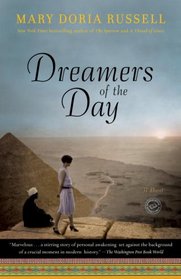Helpful Score: 3
This is the story of Agnes Shanklin, a middle-aged woman from Ohio who has been under the thumb of her mother her entire life. Then, in 1919, the influenza epidemic takes the lives of her entire family and she suddenly finds herself the heiress of a sizable chunk of change and free from any obligations. She decides to take a trip to Egypt, and in 1921 find herself mixed up in the periphery of the Cairo Peace Convention.
Mary Doria Russell, the author of one of my favorite novels, "The Sparrow," is an amazing storyteller, but this book left me unsatisfied. It felt a bit Forrest Gumpish in that Agnes happened to be on the scene for these important historical events. I wasn't able to suspend disbelief enough to accept that a no-name woman from Ohio would be welcomed into the social and political circles of the likes of T.E. Lawrence, Lady Gertrude Bell, and Winston Churchill.
I also felt, reading this book, like I was being preached to--not about God--and it seemed the author made a special point of not making this about God--but about war and peace and how we should all treat each other as equals. We should all let everybody make their own decisions, and we should learn from our mistakes of the past and not continue to make the same mistakes now. A little of this would have been ok, but she was relentless. I felt like she was preaching to the choir and I grew a bit weary of hearing about it.
I also felt that the idea of Agnes telling this from the grave was a little lame. Agnes is Forrest Gump even in purgatory, as she looks down on the earth and discusses war and current events with the likes of Ptolemy XIII, Saint Francis, Napoleon Bonaparte, and George McClellan. This section just seems hokey and random.
Despite all of these things, and despite the fact that the narrator's attention seem to flitter from one subject to the next, I really did enjoy this novel. I was engrossed in the story and didn't want to put it down, wondering what might possibly happen next. Plus, it is a helpful history lesson and a bit of insight into why the Middle East is having the troubles it's having now and why what we're doing now to try to fix it is unlikely to be successful.
Mary Doria Russell, the author of one of my favorite novels, "The Sparrow," is an amazing storyteller, but this book left me unsatisfied. It felt a bit Forrest Gumpish in that Agnes happened to be on the scene for these important historical events. I wasn't able to suspend disbelief enough to accept that a no-name woman from Ohio would be welcomed into the social and political circles of the likes of T.E. Lawrence, Lady Gertrude Bell, and Winston Churchill.
I also felt, reading this book, like I was being preached to--not about God--and it seemed the author made a special point of not making this about God--but about war and peace and how we should all treat each other as equals. We should all let everybody make their own decisions, and we should learn from our mistakes of the past and not continue to make the same mistakes now. A little of this would have been ok, but she was relentless. I felt like she was preaching to the choir and I grew a bit weary of hearing about it.
I also felt that the idea of Agnes telling this from the grave was a little lame. Agnes is Forrest Gump even in purgatory, as she looks down on the earth and discusses war and current events with the likes of Ptolemy XIII, Saint Francis, Napoleon Bonaparte, and George McClellan. This section just seems hokey and random.
Despite all of these things, and despite the fact that the narrator's attention seem to flitter from one subject to the next, I really did enjoy this novel. I was engrossed in the story and didn't want to put it down, wondering what might possibly happen next. Plus, it is a helpful history lesson and a bit of insight into why the Middle East is having the troubles it's having now and why what we're doing now to try to fix it is unlikely to be successful.





![header=[] body=[Get a free book credit right now by joining the club and listing 5 books you have and are willing to share with other members!] Help icon](/images/question.gif?v=52444873)
